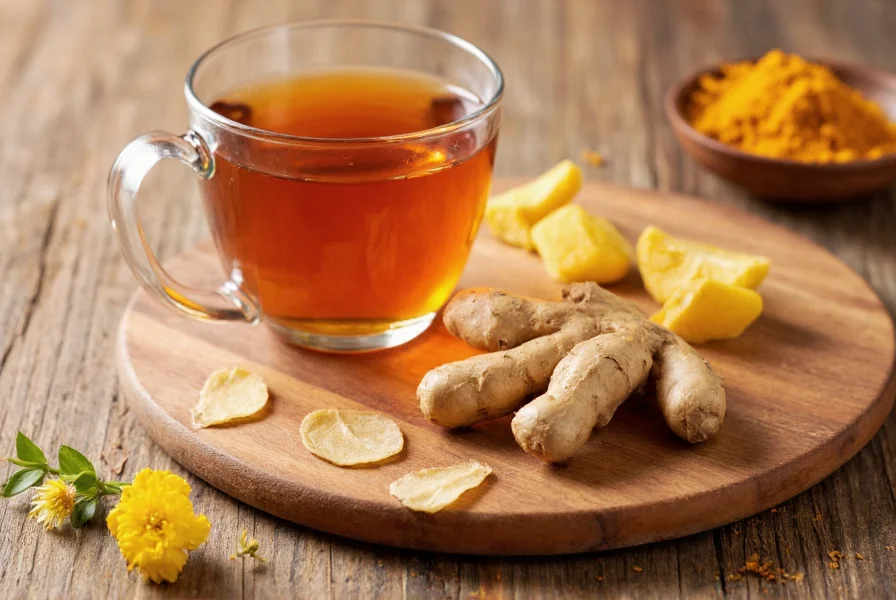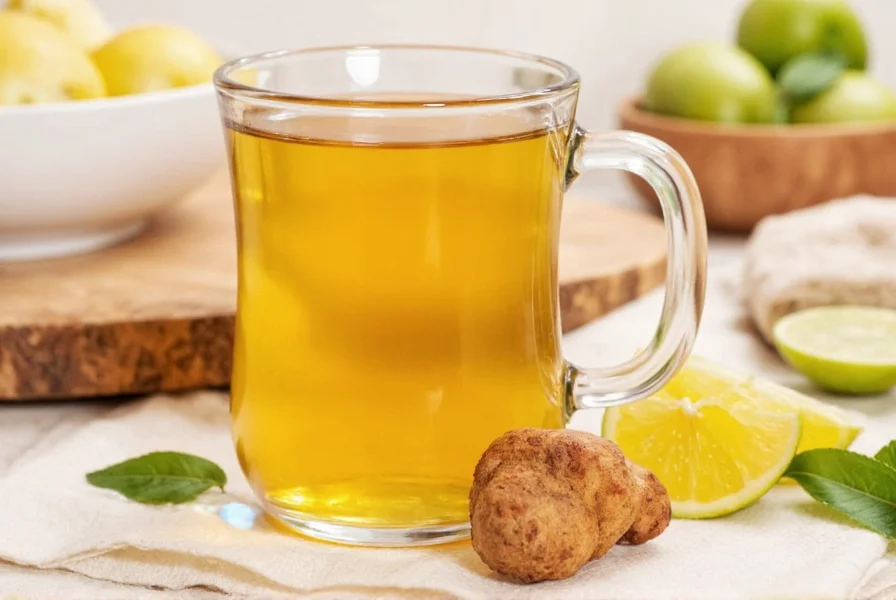For centuries, traditional medicine systems have utilized ginger and turmeric for their therapeutic properties. Modern research continues to investigate these ancient remedies, revealing promising but often preliminary findings about their potential health benefits. This comprehensive guide examines what science actually tells us about drinking ginger and turmeric tea, separating evidence-based facts from popular claims.
The Science Behind Ginger and Turmeric
Ginger (Zingiber officinale) contains gingerols, the primary bioactive compounds responsible for its distinctive flavor and potential health effects. Turmeric (Curcuma longa), a member of the ginger family, features curcumin as its most studied component. These compounds demonstrate biological activity in laboratory settings, though human studies often show more modest effects.
When combined in tea form, these ingredients create a synergistic beverage that may enhance bioavailability. Research published in the Journal of Medicinal Food suggests that consuming turmeric with black pepper (piperine) and healthy fats can increase curcumin absorption by up to 2,000%. While tea doesn't typically contain these enhancers, the warm liquid base may still improve compound extraction from the roots.
Evidence-Based Health Benefits of Ginger Turmeric Tea
Current scientific understanding reveals several potential benefits associated with regular consumption of ginger and turmeric tea:
| Benefit | Scientific Support Level | Key Research Findings |
|---|---|---|
| Anti-inflammatory effects | Moderate | Multiple studies show reduced inflammatory markers; may help with osteoarthritis symptoms |
| Digestive support | Strong | Ginger demonstrates effectiveness for nausea relief, including morning sickness and chemotherapy-induced nausea |
| Antioxidant properties | Strong | Both ingredients show significant free radical scavenging activity in laboratory studies |
| Immune system modulation | Preliminary | Early research suggests potential immune-regulating effects, but human evidence is limited |
How to Prepare Effective Ginger Turmeric Tea
Maximizing the potential benefits of ginger turmeric tea requires proper preparation techniques. The following evidence-based method optimizes compound extraction:
- Use fresh, organic ginger and turmeric roots (about 1 inch each)
- Thoroughly wash and thinly slice the roots to increase surface area
- Add to 2 cups of filtered water and bring to a gentle boil
- Simmer for 15-20 minutes (longer simmering increases compound extraction)
- Add a pinch of black pepper and 1/2 teaspoon of healthy fat (coconut oil or ghee) to enhance curcumin absorption
- Strain and optionally add lemon or raw honey to taste

Recommended Consumption Guidelines
While generally safe for most adults, appropriate consumption amounts vary based on individual health status:
- General wellness: 1-2 cups daily, preferably with meals
- Digestive support: Consume 20-30 minutes before meals
- Anti-inflammatory purposes: May require consistent daily consumption for 4-8 weeks to notice effects
Research suggests that consuming up to 4 grams of ginger daily appears safe for most adults, while turmeric consumption up to 500mg of curcumin (approximately 1-2 teaspoons of fresh turmeric) is generally well-tolerated. However, these amounts refer to the raw ingredients, not the brewed tea.
Potential Side Effects and Contraindications
Despite their natural origins, ginger and turmeric can cause adverse effects in certain individuals:
- Ginger may interact with blood-thinning medications like warfarin
- Turmeric may exacerbate gallbladder issues or interact with diabetes medications
- Both ingredients may cause heartburn or gastrointestinal discomfort in sensitive individuals
- Pregnant women should limit ginger intake to 1 gram daily without medical supervision
A systematic review in Food and Chemical Toxicology concluded that turmeric is generally safe at culinary doses but noted potential concerns with excessive supplementation. Individuals with bleeding disorders, gallstones, or those taking certain medications should consult healthcare providers before regular consumption.
Comparing Ginger Turmeric Tea to Other Herbal Remedies
When evaluating natural remedies, understanding relative effectiveness helps make informed choices:
- Compared to green tea: Ginger turmeric tea lacks catechins but offers different anti-inflammatory compounds
- Compared to chamomile: Provides more pronounced anti-inflammatory effects but less sedative properties
- Compared to echinacea: Better supported for digestive health than immune boosting during cold season
Unlike many commercial herbal blends, pure ginger turmeric tea avoids added sugars and artificial ingredients, making it a cleaner option for those seeking natural wellness support. The benefits of drinking ginger turmeric tea daily appear most consistent for digestive health and mild inflammation reduction.
Practical Tips for Incorporating Into Your Routine
For those interested in making ginger turmeric tea a regular part of their wellness routine:
- Prepare a larger batch and store in glass containers for up to 3 days
- Freeze excess tea in ice cube trays for convenient single servings
- Combine with other beneficial ingredients like cinnamon or lemon for enhanced effects
- Track your consumption and any noticed effects in a wellness journal

Consistency matters more than intensity when incorporating herbal remedies. The optimal time to drink ginger turmeric tea for digestion appears to be 20-30 minutes before meals, while consuming it in the evening may support relaxation without the caffeine found in traditional teas.
Conclusion: A Balanced Perspective
Ginger turmeric tea represents a promising addition to a healthy lifestyle, supported by both traditional use and emerging scientific evidence. While not a miracle cure, its potential anti-inflammatory and digestive benefits make it a valuable component of a holistic wellness approach. As with any natural remedy, realistic expectations and attention to individual responses are crucial.
Current research suggests that the health effects of regular ginger turmeric tea consumption are generally positive when consumed in culinary amounts, but should complement rather than replace conventional medical treatments for specific health conditions. The growing body of evidence continues to refine our understanding of how these ancient remedies can support modern health needs.
How often should I drink ginger turmeric tea for maximum benefits?
For general wellness, 1-2 cups daily is typically sufficient. Those seeking specific therapeutic effects may benefit from consistent daily consumption for 4-8 weeks. However, individuals with certain medical conditions or taking medications should consult healthcare providers for personalized recommendations.
Can drinking ginger turmeric tea help with weight loss?
While some studies suggest ginger and turmeric may support metabolic health, there's limited direct evidence that ginger turmeric tea causes significant weight loss. Any effects would likely be modest and work best as part of a comprehensive approach including proper diet and exercise. The tea may help with digestion and reducing inflammation, which could indirectly support weight management efforts.
What are the potential side effects of drinking too much ginger turmeric tea?
Excessive consumption may cause heartburn, stomach upset, or diarrhea. Ginger in large amounts may interact with blood thinners, while turmeric may exacerbate gallbladder issues. Most adults tolerate up to 4 grams of ginger and 500mg of curcumin daily, but these amounts refer to the raw ingredients, not the brewed tea. If you experience adverse effects, reduce consumption or discontinue use.
When is the best time to drink ginger turmeric tea for inflammation?
For inflammation support, consuming ginger turmeric tea consistently throughout the day may provide the most benefit. Many people find morning consumption helpful for starting the day with anti-inflammatory compounds, while others prefer evening consumption to support overnight recovery. Adding black pepper and a small amount of healthy fat can significantly enhance curcumin absorption, regardless of timing.
Can I drink ginger turmeric tea while pregnant?
Ginger in moderate amounts (up to 1 gram daily) is generally considered safe during pregnancy and may help with morning sickness. However, turmeric in medicinal amounts is not recommended during pregnancy as it may stimulate the uterus. Pregnant women should consult their healthcare provider before regular consumption and limit intake to culinary amounts (about 1/4-1/2 teaspoon of fresh turmeric per cup).











 浙公网安备
33010002000092号
浙公网安备
33010002000092号 浙B2-20120091-4
浙B2-20120091-4